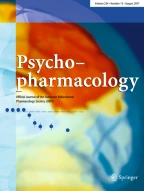Abstract
Rationale: A serotonergic dysfunction is supposed to play a pathogenetic role in depression, but there is a considerable number of non-responders in the acute treatment of depression with serotonergic agents like SSRI. Thus, an indicator of central serotonergic activity could lead to a more specific pharmacological treatment of depression. In animal and human data there is a growing amount of evidence that a strong loudness dependency of late auditory evoked potentials (LDAEP) is an indicator of low serotonergic activity and vice versa. Objective: In 29 depressive inpatients (DSM-III-R diagnosis 296.x in 28 patients, 300.4 in one patient), the hypothesis was tested that a strong LDAEP prior to treatment can predict a better clinical outcome under SSRI treatment over 4 weeks. Results: Patients with a strong pre-treatment LDAEP had a significantly greater decrease of depressive symptoms (Hamilton Scale for Depression) after 4 weeks than patients with a flat LDAEP. Significantly more responders fell into the group with a high LDAEP. Contrary to what might be expected, a second recording in a subsample of 19 patients after 4 weeks of treatment failed to show changes in the LDAEP. Conclusion: Our finding confirms the hypothesis that a strong LDAEP, indicating a low serotonergic activity, is related to a favorable response to acute SSRI treatment in depression. The LDAEP is a promising tool for the prediction of response to serotonin agonists in depression and it seems to be of clinical importance.
Similar content being viewed by others
Author information
Authors and Affiliations
Additional information
Received: 11 June 1999 / Final version: 27 October 1999
Rights and permissions
About this article
Cite this article
Gallinat, J., Bottlender, R., Juckel, G. et al. The loudness dependency of the auditory evoked N1/P2-component as a predictor of the acute SSRI response in depression. Psychopharmacology 148, 404–411 (2000). https://doi.org/10.1007/s002130050070
Issue Date:
DOI: https://doi.org/10.1007/s002130050070
